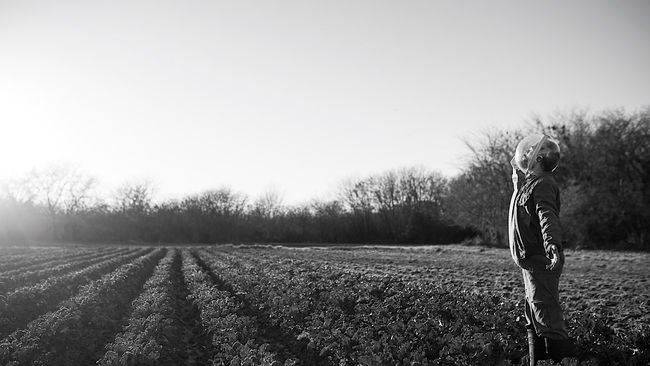Pure cinema and the human condition
27 January 2017
On Thursday evening the Jan Němec Retrospective kicked off at Planet IFFR and it did so with possibly one of the strongest sensory experience of this festival – it is but a classic. While Němec is closely associated with the Czech New Wave, one might be surprised watching his films for the first time – it is not by chance that film critics awarded him with the title of the enfant terrible of the Czech New Wave.
The retrospective kicked off with two of Němec's first films – his short graduation film A Loaf of Bread (Sousto, 1960) and his first feature, Diamonds of the Night (Diamenty noci, 1964), as well as with a short documentary on Arnold Luštig, the Czech writer whose works inspired Němec to make the two mentioned films. We were joined at the opening of the retrospective by some of Němec‘s closest partners in work and life – his wife and producer Iva Ruszalkova among others, as well as the author of a monograph on Jan Němec, Jan Bernard, who greeted us with a short introduction into the first screening.
Arnold Luštig
First we saw the documentary in which Němec closely follows Arnold Luštig, taking him to places in Terezin where the latter lived in a ghetto as a boy during the Second World War. Luštig shares with him short fragments of life from those times, some which inspired his literary work and some, as he puts it, which he would prefer to forget. While one memory revolves around stealing food from the German guards, the other evokes his work with building railway tracks. By building the tracks, Luštig explains while Němec closes up the camera at the end of the documentary, Terezin could be directly connected to Auschwitz.
It is with this chilling absurdity in mind that Němec's graduation film began to screen. The sequence not only proved to be a well-thought one knowing that both A Loaf of Bread and Diamonds of the Night were inspired by either Luštig's own personal story or his writings on the topic of war experiences, but also because all of the films carry this similar frightening absurdity that probably only exists in extreme situations as that of war and of the absolute of a pure struggle for survival.
Hunger
A Loaf of Bread portrays a quick theft of bread carried out by starved prisoners while making a stop on their way on the notorious cattle wagon-trains to a concentration camp. The three prisoners succeed by risking their lives for a loaf of bread in a harrowing scene with only seconds deciding on their lives. The “thief” gets beaten severely by a guard when caught running, however, the guard failed to notice the actual theft. Before eating the loaf of bread, one of the three, almost as a joking punch line, remarks that they can now once again wish that they won't be continuing their ride sooner than the next day.
As such, A Loaf of Bread works as a sort of a prequel to Diamonds of the Night, setting its tone and introducing one of its main motifs: hunger. The film starts in medias res. We see two nameless characters jumping from a train; the hand-held camera follows them fleeing towards the forest without words. All we hear is the cracking of the branches, some distant shooting, the tired steps, the heavy breathing. Walking through the forest, a certain nocturnal cacophony of sounds comes to life as well. The men are out of breath, they barely keep on going, yet they continue. The camera follows them, disoriented in sharpening and blurring the picture as if it too is only half-conscious, closing up their exhausted faces all while cutting the scenes every few seconds to cut-jump into a flashback of hallucinatory memories of the men’s past. The first words are uttered after what is probably at least fifteen minutes and the dialogues don’t actually ever become a real part of the storytelling. These words are as self-intended and as hallucinatory as the flashbacks that keep on appearing. The men move through the forest, they come to a village, and all they need is something to eat.
It is pure cinema at its finest - the flashbacks are never explanatory or explained and the editing follows an associative logic that corresponds to the subconscious stream of incomplete thoughts, sometimes functioning merely as ripped pieces of a radically exhausted state of mind and body, interwoven into a dialogue-less journey of images, be it naturalistic or completely surreal.
Disturbing absurdism
The reality merges with the dreamlike in scenes such as that of ants filling the eyeholes of one of the men, an image immediately echoing Luis Buñuel and Němec intensifies the men’s psychological state by amplifying certain diegetic sounds – steps, loud chewing, gulping. The two men are extremely hungry; their mouths are dry to the point when their first bites make them bleed. They get their share of bread and milk, but, just as with the loaf from the previous film, this does not guarantee survival.
The ambiguous double ending works perfectly with the surreal violent what-if flashes that appear to one of the men, while the last scene brings the same disturbing absurdist feel that kept with us from the first film of the sequence.
Němec didn’t want to tell a story, he did not want to talk about the war or the holocaust; he wanted to show a pure human condition in which words simply seem obsolete. The bigger part of this condition being direly preoccupied with the thought of food, it was even more unsettling when the diegetic sounds of two starved men hyper-sensitively listening to others devouring food were joined by unwrapping of candies and rustling of snack bags among the audience.
Retrospective Jan Němec








